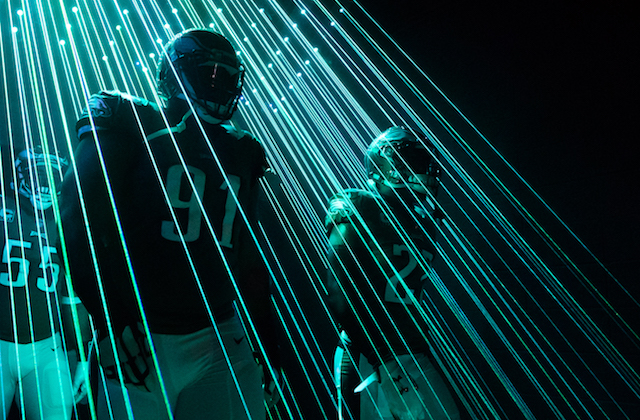The streets of Philadelphia are green with Eagles jerseys today (February 8), as thousands of fans attend the parade celebrating the team’s victory in Super Bowl LII on Sunday (February 4).
Today’s festivitites signal the end of a National Football League (NFL) season marked by political contention over player protests, Colin Kaepernick accusing NFL excutives of retaliation for his activism, and a multi-million-dollar committment to players’ community advocacy. Eagles players like Players Coalition leader Malcolm Jenkins—who negotiated the league deal despite outrage from Kaepernick’s allies—positioned themselves at the center of these issues and were dubbed the NFL’s "wokest team."
Dive into these conversations with these must-read articles from Black writers about the Super Bowl victors:
"Malcolm Jenkins and Chris Long Proved That Activism Isn’t a ‘Distraction’ in the NFL"
By Thomas George, SB Nation
Jenkins and Long have been called attention grabbers and trouble makers. Some extremist labeled them much worse. They entered a political conversation that was on fire at a time in U.S. history where discussions and actions over race, inclusion, immigration, education and police responsibility continue to percolate.
Had Jenkins and Long not deftly handled their roles within the Eagles, a locker room might have been splintered and a season wrecked.
"A Protest Divided"
By Howard Bryant, ESPN The Magazine
For a few weeks between late October and early November, the [Players Coalition members] appeared unified; in group chats and phone calls, they discussed strategy for negotiating with the owners. Through [San Francisco 49ers player Eric] Reid, Kaepernick was kept up to speed, and Kaepernick soon agreed to join the coalition.
But the coalition was fracturing along a tenuous line. Players like Reid, who primarily protested by taking a knee and who believed their protest was directly linked to Kaepernick’s employment, saw themselves as taking the greatest risk. Kaepernick was out of the league, as was longtime veteran defensive back Antonio Cromartie, who had taken a knee to start 2016 and was cut after four games by the Colts. Reid himself was in a contract year. And although Jenkins maintained that all the players in the coalition could offer input on a massive group text-messaging chain, the kneelers felt as if they had nominal influence. … There was jousting between Kaepernick and Jenkins about leadership of the coalition. Reid says the group had agreed that there would be an inclusive leadership structure, yet he felt that Jenkins had annointed himself the leader of the coalition. Meanwhile, Jenkins says his only goal was to have players united to fight issues important to them—he was moved to action when police killed Philando Castile and Alton Sterling, the same as Reid and Kaepernick.
"How the Eagles Sneaked a Little Protest Into the Super Bowl"
By Gene Demby, NPR Code Switch
The Eagles picked [the Meek Mill song] "Dreams and Nightmares" as their hype song for functional reasons—it’s a song about overcoming long odds and constructed to make you feel like you can run through a brick wall—but there was something political about the choice as well. Meek had been on probation for nearly a decade stemming from a gun conviction he received in 2008, when he was 21. Then last year, he was sentenced to two to four years in prison for violating those probation terms. He had a long and spotty probation history, with a grip of failed drug tests and missed court appearances, some of which extended his probation. After his sentencing, several Eagles’ players attended a rally protesting the decision.
"The Eagles Won Big Sunday Night, and So Did White Privilege"
By Ernest Owens, Philadelphia Magazine
When so many are chanting "Fly Eagles Fly," I am reminded of the double standards around these celebrations. Crowds of White people, in all of their unapologetic privilege, got publicly drunk, set fires, scaled traffic poles and disrespected city monuments on Sunday night—and everyone cheered them on. "It’s a Philly thing," I heard down my newsfeed as people relished in the team’s victory. There had been reports of violence before the game even started, and based on press conferences last week, the police weren’t planning to stop the antics, but merely manage them.
[…]
But people of color are never given the same benefit of a doubt, and that matters. It’s hard to celebrate the Eagles victory as a Black Philadelphian because the very injustice that Kaepernick was calling out is happening right now. Regardless of our individual politics, we all can admit that if a quarter of those rowdy Eagles fans had been Black, police presence and aggression would have been doubled at least. Interestingly enough, many of my Black social media followers were warning others to “be safe” and “make it home soon” to avoid the expected targeting they knew would occur if they were around the madness.
"Week Two: Malcolm Jenkins’ Criminal Justice Season"
Malcolm Jenkins, The Philadelphia Citizen
I’m pushing for reforms like Clean Slate and [Targeted Community Alternatives to Prison] because, as a Black man in America, I can see myself in all those who find themselves swept up in the criminal justice system. Too many of us look at those stories and say, "That’s not me, I can let that go." But you don’t need to be touched directly by injustice to fight against it.
